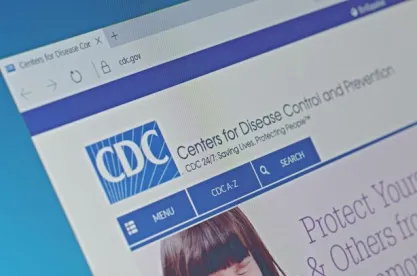As employers continue to grapple with a safe return to the workplace, the U.S. Centers for Disease Control and Prevention (CDC) issued new guidance for businesses and employers on SARS-CoV-2 testing of employees, as part of a more comprehensive approach to reducing transmission of the virus in non-healthcare workplaces. SARS-CoV-2 is the virus that causes COVID-19.
While the CDC had already released some guidance on the matter of workplace testing (last updated in October 2020), the guidance issued on January 21, 2021, places a new emphasis on informed consent prior to testing and the measures an employer can take to ensure employees are fully supported in their decision-making.
The CDC’s guidance states:
Workplace-based testing should not be conducted without the employee’s informed consent. Informed consent requires disclosure, understanding, and free choice, and is necessary for an employee to act independently and make choices according to their values, goals, and preferences.
Emphasis in original.
For employers that have required employees to submit to COVID-19 viral testing in order to enter the workplace consistent with Equal Employment Opportunity Commission (EEOC) guidance, the CDC’s reference to an informed consent may appear a bit tardy. However, while the CDC’s guidance appears to set standards for meaningful informed “consent,” it does not appear to prevent employers from requiring testing that does not include all of the “elements of consent” and “recommended disclosures” referenced in the guidance. Nor does it appear to prevent employers from requiring testing as a condition of entering the workplace. The CDC’s guidance clearly recommends, however, that employers provide employees:
complete and understandable information about how the employer’s testing program may impact employees’ lives, such as if a positive test result or declination to participate in testing may mean exclusion from work.
Emphasis added.
Basic Considerations
When developing a SAR-CoV-2 testing program, according to the CDC, an employer should first address some basic considerations. For example:
-
Why is the employer offering the test to begin with
-
How frequently will employees be tested
-
How to effectively obtain employee consent
-
What to do if an employee declines to be tested
Key Measures to Implement
The CDC provides a list of key measures an employer should implement when developing an SAR-CoV-2 testing program in the workplace to ensure employee informed consent and a supportive environment:
-
Ensure safeguards are in place to protect an employee’s privacy and confidentiality.
-
As noted above, provide complete and understandable information about how the employer’s testing program may impact employees’ lives, such as if a positive test result or declination to participate in testing may mean exclusion from work.
-
Explain any parts of the testing program an employee would consider especially important when deciding whether to participate. This involves explaining the key reasons that may guide their decision.
-
Provide information about the testing program in the employee’s preferred language using non-technical terms. Consider obtaining employee input on the readability of the information. Employers can use this tool provided by the CDC to create clear messages.
-
Encourage supervisors and coworkers to avoid pressuring employees to participate in testing.
-
Encourage and answer questions during the consent process. The consent process is active information sharing between an employer or their representative and an employee, in which the employer discloses the information, answers questions to facilitate understanding, and promotes the employee’s free choice.
In addition, in order to ensure informed consent, an employee must be provided certain disclosures regarding the workplace testing program. Of course, the disclosures must include those required in the U.S. Food and Drug Administration (FDA) emergency use authorization patient fact sheet external for the particular test, such as the type of the test, how the test will be performed, and known and potential risks. Importantly, these disclosures must be provided during the consent process; meaning, employers will have to know this information and ensure it is provided to employees prior to the employee agreeing to the test.
Employers will need to consider which aspects of the testing program may be more relevant than others to an employee’s decision whether to accept an offered test and include the appropriate disclosures. Areas to consider include:
-
The process for scheduling tests and how the cost of the tests will be covered;
-
What employees should expect at the testing site (e.g., screening);
-
Recommended next steps if an employee tests positive; and
-
What assistance is available should an employee be injured while the test is administered.
Privacy and Security Issues
There are, of course, privacy and security issues to consider when implementing such a program. For example, an employer must consider what personal information the employee will need to provide to the test provider (e.g., name, date of birth, insurance, and so on), the test results to follow, and the myriad of issues that arise once that information is obtained. For example:
-
Whether, where, and for how long the employer will retain the results?
-
How will personal information be kept confidential and secure and how will the employer keep the results confidential and secure?
-
Who will have access to the results?
The employee’s test results will be considered confidential medical information and, while not subject to HIPAA in the employer-employee context, this information still may be protected under state statutory and common law. Consider, for example, that some states, (such as California and Florida) include “medical information” as part of the definition of “personal information” under their breach notification laws. Accordingly, if that information is breached, which could include access to the information by an unauthorized party, notification to affected individuals and relevant state agencies may be required. Additionally, statutory and common law obligations exist requiring employers to safeguard employee personal information, which may include information about their physical health, such as test results or information provided by the employee before taking the test.
Thus, maintaining reasonable safeguards to protect such information is prudent. This might include access management measures and record retention and destruction policies. It also may include having clear guidelines for making disclosures of this information and determining whether an authorization is needed before such information may be disclosed to, or accessed by, a third party.









 />i
/>i

